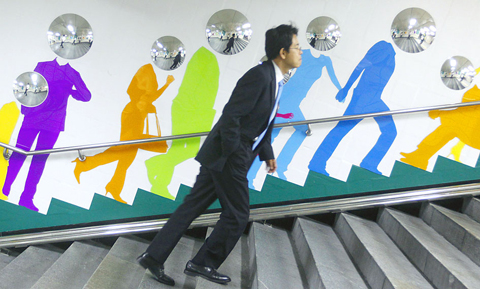The South Korean economy expanded in the second quarter at a faster pace than initially estimated, driven by consumer spending and business and construction investment.
GDP grew 2.6 percent from the previous three months, compared with the July 24 estimate of 2.3 percent, the Bank of Korea said in Seoul yesterday. The economy shrank 2.2 percent from a year earlier, compared with the previously published 2.5 percent decline.
“The revision shows private demand is actually picking up and growth is not just driven by government support,” said Kwon Young-sun, a Hong Kong-based economist at Nomura Holdings Inc. “I believe the current upswing will continue as there’s room for more factory output amid lean inventory.”

PHOTO: REUTERS
The benchmark KOSPI stock index has gained 43 percent this year and the currency 1 percent against the dollar, the third-best performer among Asia’s 10 most-traded currencies excluding the yen. Exporters including Samsung Electronics Co, Hyundai Motor Co and LG Electronics Inc boosted profits last quarter as South Korea, China and Singapore led a regional rebound.
South Korea’s economic expansion in the three months to June 30 is its fastest since the fourth quarter of 2003.
Private consumption advanced 3.6 percent from the first quarter, compared with a 3.3 percent expansion in the initial GDP report, due to increased spending on goods such as cars.
Corporate investment at factories and for equipment climbed 10.1 percent from the first quarter, compared with the previously published 8.4 percent gain.
The economy has achieved one of the highest growth rates among OECD countries as support from the government and the central bank bore fruit, Jung Yung-taek, head of the Bank of Korea’s national income statistics team, said in Seoul yesterday.
The bank has no immediate plan to revise its yearly gross domestic product estimate, he said. The Bank of Korea forecast in July the economy would contract 1.6 percent this year.
Last month, the bank kept its benchmark interest rate unchanged at a record low 2 percent for a sixth consecutive month.
The government has pledged more than 67 trillion won (US$54 billion) in stimulus, injected money into the financial system and set up a fund to replenish bank capital.
The IMF last month said South Korea’s economy will contract a less-than-estimated 1.8 percent this year. Citigroup Inc said last month that the South Korean economy could contract 1.5 percent this year, less than its previous estimate, as exports would be “more resilient” than expected.
Exports gained 14.7 percent in the second quarter from the previous three months, the same as the expansion reported in July. Construction investment grew 1.7 percent from three months earlier, compared with the 0.4 percent gain initially announced.
Government spending increased 1.1 percent from the first quarter, compared with the 1 percent gain initially announced.

MORE VISITORS: The Tourism Administration said that it is seeing positive prospects in its efforts to expand the tourism market in North America and Europe Taiwan has been ranked as the cheapest place in the world to travel to this year, based on a list recommended by NerdWallet. The San Francisco-based personal finance company said that Taiwan topped the list of 16 nations it chose for budget travelers because US tourists do not need visas and travelers can easily have a good meal for less than US$10. A bus ride in Taipei costs just under US$0.50, while subway rides start at US$0.60, the firm said, adding that public transportation in Taiwan is easy to navigate. The firm also called Taiwan a “food lover’s paradise,” citing inexpensive breakfast stalls

TRADE: A mandatory declaration of origin for manufactured goods bound for the US is to take effect on May 7 to block China from exploiting Taiwan’s trade channels All products manufactured in Taiwan and exported to the US must include a signed declaration of origin starting on May 7, the Bureau of Foreign Trade announced yesterday. US President Donald Trump on April 2 imposed a 32 percent tariff on imports from Taiwan, but one week later announced a 90-day pause on its implementation. However, a universal 10 percent tariff was immediately applied to most imports from around the world. On April 12, the Trump administration further exempted computers, smartphones and semiconductors from the new tariffs. In response, President William Lai’s (賴清德) administration has introduced a series of countermeasures to support affected

CROSS-STRAIT: The vast majority of Taiwanese support maintaining the ‘status quo,’ while concern is rising about Beijing’s influence operations More than eight out of 10 Taiwanese reject Beijing’s “one country, two systems” framework for cross-strait relations, according to a survey released by the Mainland Affairs Council (MAC) on Thursday. The MAC’s latest quarterly survey found that 84.4 percent of respondents opposed Beijing’s “one country, two systems” formula for handling cross-strait relations — a figure consistent with past polling. Over the past three years, opposition to the framework has remained high, ranging from a low of 83.6 percent in April 2023 to a peak of 89.6 percent in April last year. In the most recent poll, 82.5 percent also rejected China’s

PLUGGING HOLES: The amendments would bring the legislation in line with systems found in other countries such as Japan and the US, Legislator Chen Kuan-ting said Democratic Progressive Party (DPP) Legislator Chen Kuan-ting (陳冠廷) has proposed amending national security legislation amid a spate of espionage cases. Potential gaps in security vetting procedures for personnel with access to sensitive information prompted him to propose the amendments, which would introduce changes to Article 14 of the Classified National Security Information Protection Act (國家機密保護法), Chen said yesterday. The proposal, which aims to enhance interagency vetting procedures and reduce the risk of classified information leaks, would establish a comprehensive security clearance system in Taiwan, he said. The amendment would require character and loyalty checks for civil servants and intelligence personnel prior to